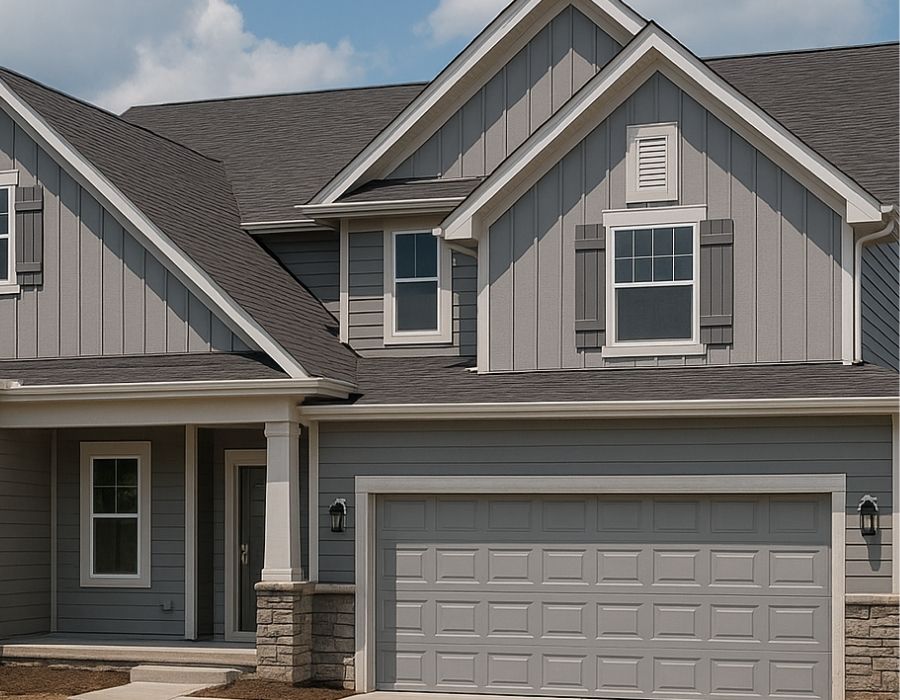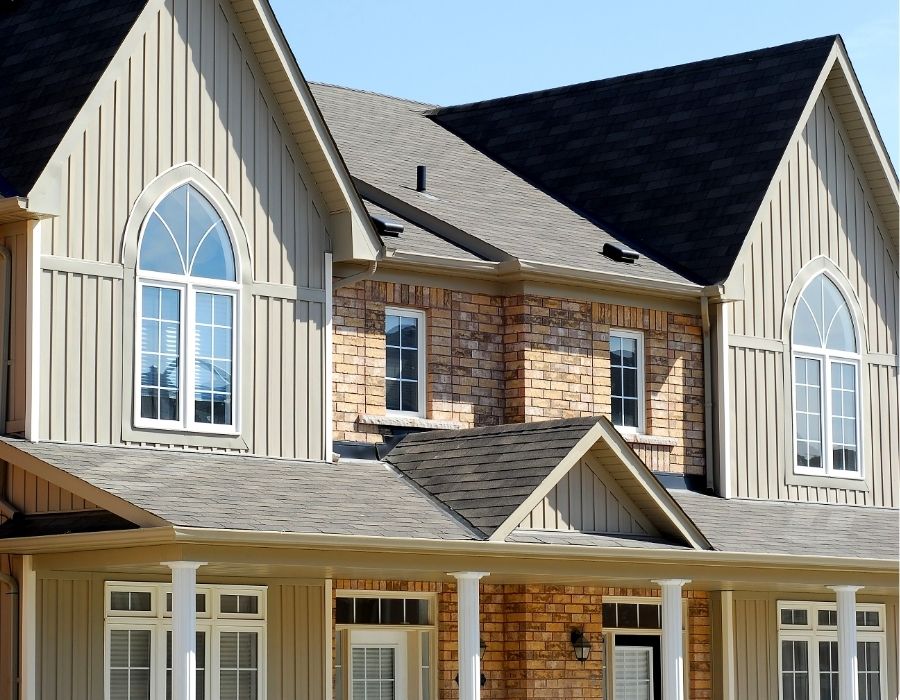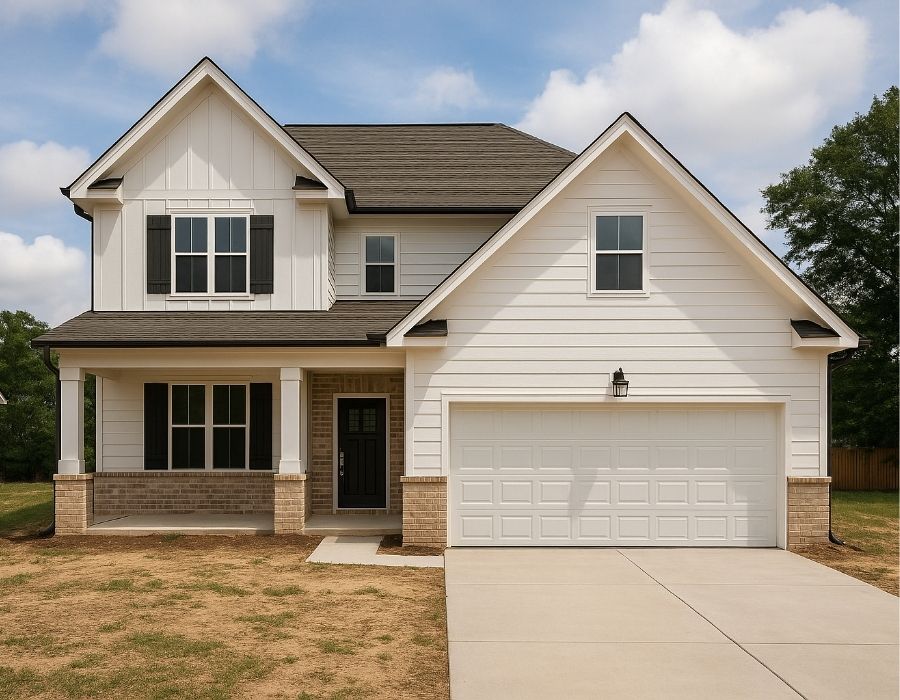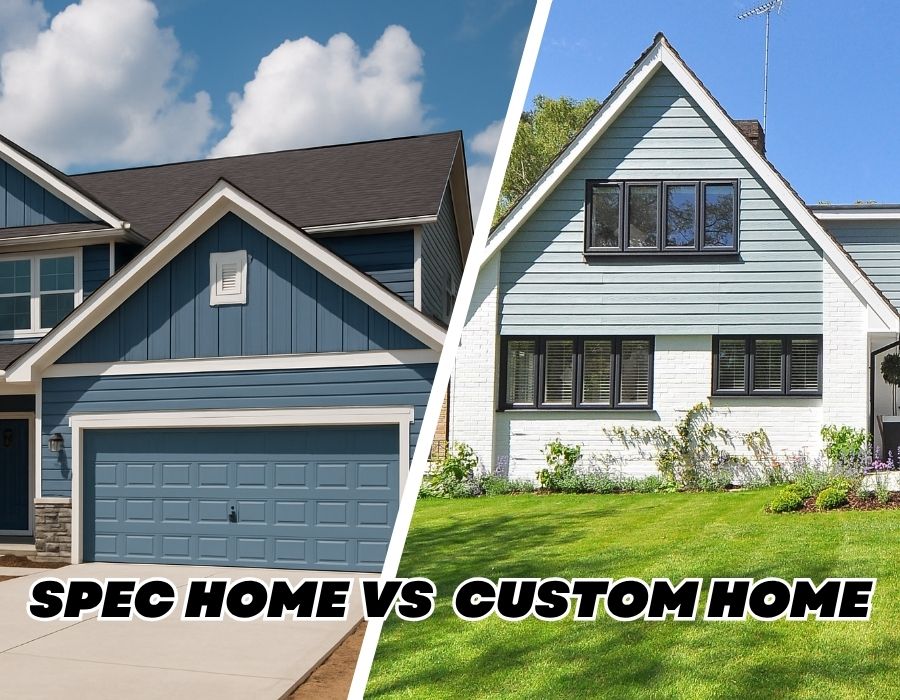Spec Home Build vs. Custom Home Build: Which Should You Choose?
Deciding between a spec home and a custom home can be as crucial as choosing a suitable investment for your future. Both options come with distinctive advantages and challenges, making it essential to understand which best aligns with your needs and expectations. Choosing between a spec home and a custom house impacts your lifestyle, comfort, and financial wellbeing. Whether you value immediate availability and affordability or desire a home tailored to your specifications, this decision will shape your living experience for years.
Yes, the decision to purchase a spec home versus building a custom home can be a daunting one. However, we’ve compiled a guide to help you discern between the two and decide which type of home is best for you. Here we’ll explain the differences between a spec home and a custom home, the advantages and disadvantages of each, and how to decide what’s right for you.
Understanding Spec Home Building

Definition of Spec Homes
Developers build speculative (spec) homes without a specific buyer in mind. They are constructed based on market trends and intended to appeal to a broad audience. Developers speculate that these homes will sell quickly.
Characteristics of Spec Homes
Spec homes typically feature standardized designs and finishes aimed at broad appeal. They often come with a set floorplan and limited customization options. They are usually part of more significant developments, ensuring uniformity and cost efficiency. Nearly 70% of single-family detached homes sold in 2023 were built on lots one-fifth of an acre in size.
Process of Buying a Spec Home
Buying a spec home involves a straightforward process. Potential buyers tour available homes, choose one that meets their needs, and proceed with the purchase. Since these homes are already built or near completion, the timeline from the decision to move-in is relatively short.
According to research, only 9% of buyers contacted a bank or lender before starting home buying. A significant 51% of all home buyers found their homes online, while 28% used a real estate agent. Notably, finding the right property was the most challenging step in home buying for 56% of buyers.
Understanding Custom Home Building

Definition of Custom Homes
Custom homes are planned and built according to the buyer’s precise needs. This bespoke approach gives the buyer complete control over every home design aspect, from the floor plan to the materials utilized.
Characteristics of Custom Homes
Custom homes are unique in design and tailored to the homeowner’s preferences. They often feature high-quality materials, energy-efficient systems, and personalized finishes that reflect the owner’s taste and lifestyle. According to research by NAHB (National Association of Home Builders), custom home building expanded by 10.8 percent in 2021. This was primarily driven by solid demand for move-up purchases amid rising existing home equity.
Process of Building a Custom Home
Building a custom home involves several stages, including selecting a lot, designing the house, obtaining permits, and overseeing construction. This process requires close collaboration with architects, builders, and other experts to ensure the final product meets the buyer’s vision. According to data from the Census Bureau’s Survey of Construction (SOC), custom homes increased to 20.4 percent of all single-family homes in 2022 from the 17.6 percent recorded in 2021.
Advantages of Spec Home Building
Cost Efficiency
Spec homes generally cost less due to the reuse of a common design and bulk material purchasing. Spec homes are also commonly finished with less expensive materials.
Convenience
The convenience of moving into a ready-made home cannot be overstated. Buyers can see precisely what they are purchasing without waiting for construction to be completed. The immediate availability (or very close to it) is ideal for those who need to relocate quickly or prefer a hassle-free buying experience.
Appealing to Future Buyers
Considering how they are designed to have features and selections that the average homebuyer will like, spec homes are usually easy to sell in the future and that makes them a good investment.
Potential Cost Negotiation
Depending on the market and the builder’s situation, there may be room to negotiate the sale price.
Less Decision Making
With most design choices predetermined, buyers don’t have to stress over every detail, making the process more straightforward.
Economies of Scale
Large developments may offer cost benefits on lot prices.
Disadvantages of Spec Home Building
Limited Customization
Buyers have minimal input on the home’s design and features. What you see is what you get, with little or no room for personalization.
Potential Quality Concerns
When materials are purchased in bulk, they are usually lower grade, which is typically lower quality. It’s also common to see a lot of variation in the quality of construction in spec homes because they are commonly built with less skilled labor and because they are turned out in such a high volume and speed.
Standardization
Spec homes are often part of a larger development, leading to a lack of uniqueness. The uniformity in design and layout can make these homes feel less personalized and more like cookie-cutter models.
Minimal Warranty
Spec home builders often provide only basic warranty coverage.
Potential Hidden Costs
Although the upfront spec house price is usually lower, buyers may incur additional costs if they desire upgrades and modifications to suit their preferences. These hidden costs can add up, making the overall investment comparable or even higher than a custom home in some cases.
Less Emotional Connection
Since the buyer doesn’t participate in the design process, there may be a reduced sense of attachment.
Advantages of Custom Home Building
Tailored to Your Lifestyle and Future Needs
Unlike spec homes, a custom home allows you to consider your current lifestyle and plan for the future. Whether you need wider doorways for potential accessibility challenges, want to eliminate unnecessary rooms, or desire a kitchen layout that accommodates your family’s activities, a custom home can be designed to meet your unique requirements.
Higher Quality Construction
Custom homes often feature superior craftsmanship and high-quality materials. Builders and contractors working on custom projects typically have more experience and expertise, resulting in a well-constructed and durable home.
Property Integration
A custom home takes full advantage of your property’s characteristics. The design team can maximize views, optimize natural light, and ensure privacy by customizing the floor plan and the placement of windows and rooms. Regardless of the challenges presented by your lot, a custom home design can overcome them and create a harmonious living space.
Unmatched Personalization
The homeowner has complete control over the design, the size of the home, materials, and finishes. The result is a one-of-a-kind home that is uniquely yours. There is little to no compromise, which can’t be said for most project types.
Energy Efficiency
Custom homes offer the option to incorporate energy-efficient technologies and eco-friendly materials. This reduces the home’s environmental impact and leads to long-term saving on utility bills.
Guidance from a Trusted Advisor
A reputable custom home builder will treat you as a partner and will carefully coach you through the whole process. Relationship building is very important in the construction process because when you decide to build a custom home, you are entering into a long-term relationship with your custom home builder.
Long-Term Value
While custom homes require a higher initial investment, they often provide excellent long-term value. Combining personalized design, superior construction, and energy efficiency can result in higher resale values and reduced maintenance costs.
Disadvantages of Custom Home Building
Higher Upfront Costs
Customization comes at a premium. But because you are building a custom move-in ready home that will include everything you want, you are, in theory, saving future costs of renovations and upgrades to the house later on.
Time-Intensive Process
Building a custom home is a time-consuming process. It involves extensive planning, design, and construction phases, which can take several months to years to complete. Patience and careful coordination are essential throughout the project.
Land Acquisition Challenges
Finding suitable land for your custom-built home, especially in sought-after areas can be daunting and expensive.
Complexity of Financing
Securing financing for a custom home can be more challenging than for a spec home. Construction loans and other financial arrangements often require more detailed documentation and oversight, adding complexity to the process.
Resale Considerations
Highly personalized designs might not appeal to a broad market, potentially affecting resale value.
Spec Home vs. Custom Home: Key Differences
Design Flexibility
Spec Home: Limited to predetermined floor plans with little room for customization
Custom Home: Fully tailored to the homeowner’s specifications offering complete design flexibility
Cost
Spec Home: Typically more affordable due to standardized design and materials
Custom Home: More expensive due to personalized fixtures and custom (often superior) materials
Construction Time
Spec Home: Generally quicker to complete since the design is predetermined, and often is at or near completion when purchasing
Custom Home: Longer construction time, as it involves detailed planning and bespoke design
Buyer Involvement
Spec Home: Minimal involvement, buyers choose from existing options
Custom Home: High involvement, buyers participate in every stage of the design and build process.
Choosing the Right Option: Spec Homes vs. Custom Homes
Still trying to discern if a spec house versus a custom house is right for you? We’ve added a few metrics to help you decide if a spec home build or a custom home build designed around your every need and lifestyle is right for you.
Customization
If you constantly look at a home thinking about how it could be better or if a radically different floor plan would suit your family better, a custom home is for you. A custom home creates a haven that is unparalleled in its design and functional utility for your family. It’s more than just colors and what countertops you choose, it’s the very design of the house – the placement of rooms and windows and what opens to where. If these factors align with your plans for your life, then a custom home is the right choice for your family.
Budget
A custom home requires a broader budget than a spec home. You are spending more because you are investing in more and receiving more. If your budget isn’t yet ready for a custom home, then a spec home might be the best choice. But keep your custom home dreams in mind, gain equity, and plan that custom home in the future.
Timeline
Like anything made from scratch, a custom home build takes longer than a spec home build. If you’re short on time and just looking for a home to move into, then a spec home will likely be the best choice. But if you have a longer timeline and want to invest resources into a forever home, then a custom home rather than a spec home is an excellent choice for you.
Involvement
While the right custom home builder can guide you through the custom home building process easily, a spec home builder offers you the chance to move into a home, possibly pick between a few limited choices of fixtures and colors, and have a new home with relatively little involvement. The choice remains yours, and only your preferences can dictate whether a spec home build or a custom home build is best for you.
The Right Choice for Your New Home

As with most choices in life, the choice between a custom home builder and a spec home builder depends on your specific needs, budget, and timeline. Spec homes offer convenience and affordability making them an attractive option if you have a shorter timeline and busier schedule, However if you’re looking for a home that reflects your unique tastes and requirements, a custom home is the best choice. Understanding these differences will help you make an informed decision and ensure that your new house meets all your expectations.

